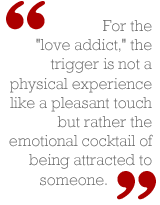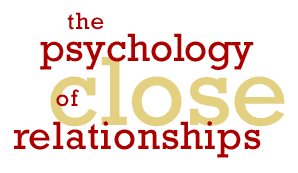





|
The Declaration of Interdependence
Ultimately, as long as you perceive the benefits to outweigh the costs of loving and being with someone, you seek that intimacy and
you stay. This is the simple reward theory of attraction.
Beyond attraction, an influential theory of how relationships develop over time extends the reward principle. This
interdependence theory posits that, once you become close to another, you regularly evaluate whether you should stay or go
according to three questions:
- Satisfaction: Do the benefits of this relationship outweigh the costs?
- Expectations: Does this relationship meet or exceed my expectations in general?
- Options: Are there alternatives for me beyond this relationship: do I have somewhere else to go or someone else to go to?
According to the theory, your answers to these questions reveal your relationship experience: your satisfaction level, expectations
and whether or not you feel "stuck" in the relationship.
According to the theory, answering 'No' to questions 1 and 2 jeopardizes your chances of being happy and staying in the relationship. If you say 'Yes' to number 3, you
risk the temptation of looking elsewhere for intimacy.
If you feel you are unhappy, disappointed, but that you have alternatives outside the relationship, you are more likely to exit the relationship. (We will
explore this calculating review process in a future session, when we examine the process of breaking up).
Even if you answered 'yes,' 'yes,' and 'no' respectively, remember that from time to time you are still likely to have periods of dissatisfaction, disappointment
and temptation. Intimacy is an intense experience and relating is hard work, as we discuss in detail in the next session.
Living with the Yin and Yang of Intimacy
Social Support
A much-studied topic in the psychology of close relationships is that of social support. Put simply, nothing can be so helpful
to you as a caring, skilled person. (Our household includes several pets, and I do find their company comforting and helpful; but
I must admit that my cats couldn't do a good job of dialing 9-1-1 in an emergency, nor could my dog whip up the kind of snack or dessert
that soothes hurt feelings quite the way a couple of my two-legged friends can).
One of the most satisfying aspects of an intimate
relationship for most of us is instant access to top-notch social support, especially when we need assistance: when we get it,
relief is palpable; when we don't, our misery and loneliness know no bounds.
Even casual relationships, like those with neighbors, carry obligations to offer support. When someone living nearby has died,
even if you barely knew them, community values urge you to bring the family a pie or casserole, mow the lawn or at least leave a
condolence card. To be on the receiving end of such gestures and generosity is no small thing: it reassures you that you and your
feelings matter. But more to the point, it lessens the pain.
To enjoy intimacy with another is to have, in a sense, a built-in source
of social support. Divisions of household labor are based on the assumption that members of a couple of family ought to take
care of each other before anyone asks less-close others for help. Social support includes emotional support, acceptance or patience,
and practical chores and favors. People with partners get more done, experience less stress and strain, than those who must go it alone.
Finding your partner offers you relief and assurance: you have found your soul mate and your helpmeet. You can quit searching.
Euphoria and Dysphoria
"Dysphoria" is the opposite of euphoria, a state of misery rather than one of apparent joy. Intimacy can produce misery simply
by its absence -- the failure to find a partner. (Be aware, however, that this may be due to your own high expectations or ambivalence
about intimacy.) When societal messages, for instance, tell you again and again that "you're nobody till somebody loves you" (as a
song used to claim), those who haven't found intimacy yet are unfairly assaulted as hapless or hopeless.
A favorite cartoon of
mine shows a grinning woman, accompanied by a nerdy looking human-headed chicken, consoling her single friend that "I
never thought I would find anyone either!" Apparently, if you'll settle for a chicken, you, too, can find love. When the rest of the
social world seems paired up like Noah's Ark, you can feel sorely tempted to lower your standards just so you can have someone
in your life -- not exactly a prescription for successful intimacy: "Darling, I settled for you."
Love's Addicts
The misery of dysphoria is not just failing to get what others seem to have. Dysphoria can also be the painful aftermath of
euphoria, a feeling that everything is wonderful, a side effect or withdrawal symptom of the euphoria of love. Dysphoria
implies the loss of having or expecting something good.
In his book, The Chemistry of Love, biochemist Michael Liebowitz
looks at the misery of psychiatric patients who seemed addicted to disastrous love. When in love, these people experienced the highest
of highs; after loss, they plummeted to the depths of depression and anguish. Liebowitz noted that these people weren't just "in love
with love." They seemed addicted to the entire miserable cycle: falling for someone; reveling in intense passion; suffering through
doubt and insecurity; agonizing over the breakdown of the relationship; and just as suddenly falling, all over again, for someone new!
Have you known someone like this? Someone who falls precariously but passionately in love, only to complain in due course of trouble:
"I don't know where I stand with him" or "She's still hung up on her ex and it's making me crazy!" The ending may be dramatic and drawn
out, with crying jags, anxiety and oaths of "Never again!" But instead of sticking to the resolution to be cautious and try living
alone for a while, the person seems immediately to search for -- and find! -- another person to become infatuated about. And the cycle
begins anew.
Liebowitz suggested that this pattern, which he calls hysteroid dysphoria, originates in brain chemistry gone awry.
Specifically, the brain produces chemicals with the same effects as strong stimulants such as amphetamines. Pleasurable experiences
trigger the release of the chemicals, creating a sense of heightened arousal, focus and euphoria.
For the "love addict," the trigger is
not a physical experience like a pleasant touch but rather the emotional cocktail of being attracted to someone. This feeling in
itself produces such pleasure that the falling in love is pursued for its own sake. After the buildup comes the letdown: When the object of
affection is removed, the pain is the lowest low, reminiscent of the crashes described by those addicted to drugs like cocaine. The
sufferer feels the only remedy for the agony is to fall in love again and so the cycle resumes.

|



